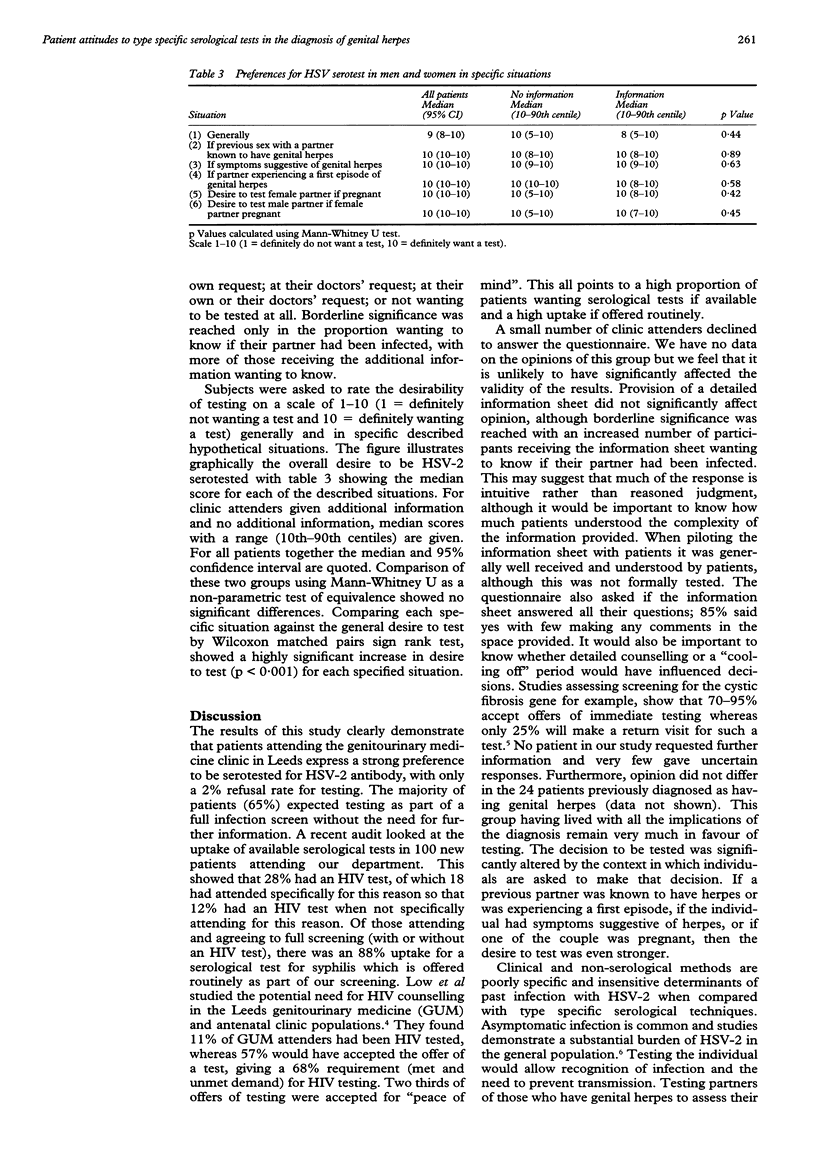Abstract
OBJECTIVE: To assess patient attitudes to HSV-2 serotesting and the effect of providing detailed information regarding genital herpes, the blood test, and its implications. METHODS: Consecutive genitourinary medicine clinic attenders were asked to complete an anonymous self administered questionnaire. Half received minimal additional information while the other half received a detailed information sheet. RESULTS: Overall, 200 clinic attenders with a median age of 27 years (range 15-57) completed the questionnaire, 92.4% wanted to know if they, and 90.8% if their partners, had been infected with genital herpes; 65% expected testing as part of screening without further discussion. Overall, on a scale of 1-10, 2% scored 1 (equivalent to definitely not wanting a test), while 45.5% scored 10 (equivalent to definitely wanting a test). The overall median score was 9 (95% confidence interval 8-10) suggesting a strong opinion in favour of testing. The desire to test in each of five described hypothetical situations increased significantly (p < 0.001) when compared with the general desire. CONCLUSIONS: Clinic attenders expressed a strong preference to be serotested for HSV-2 which was unaltered by the provision of information highlighting implications, although influenced significantly by the context in which they were asked. Should reliable tests become available the level of demand could have important implications on laboratory and counselling resources.
Full text
PDF



Selected References
These references are in PubMed. This may not be the complete list of references from this article.
- Brown Z. A., Vontver L. A., Benedetti J., Critchlow C. W., Sells C. J., Berry S., Corey L. Effects on infants of a first episode of genital herpes during pregnancy. N Engl J Med. 1987 Nov 12;317(20):1246–1251. doi: 10.1056/NEJM198711123172002. [DOI] [PubMed] [Google Scholar]
- Corey L. The current trend in genital herpes. Progress in prevention. Sex Transm Dis. 1994 Mar-Apr;21(2 Suppl):S38–S44. [PubMed] [Google Scholar]
- Cowan F. M., Johnson A. M., Ashley R., Corey L., Mindel A. Antibody to herpes simplex virus type 2 as serological marker of sexual lifestyle in populations. BMJ. 1994 Nov 19;309(6965):1325–1329. doi: 10.1136/bmj.309.6965.1325. [DOI] [PMC free article] [PubMed] [Google Scholar]
- Harris H., Scotcher D., Hartley N., Wallace A., Craufurd D., Harris R. Cystic fibrosis carrier testing in early pregnancy by general practitioners. BMJ. 1993 Jun 12;306(6892):1580–1583. doi: 10.1136/bmj.306.6892.1580. [DOI] [PMC free article] [PubMed] [Google Scholar]
- Kulhanjian J. A., Soroush V., Au D. S., Bronzan R. N., Yasukawa L. L., Weylman L. E., Arvin A. M., Prober C. G. Identification of women at unsuspected risk of primary infection with herpes simplex virus type 2 during pregnancy. N Engl J Med. 1992 Apr 2;326(14):916–920. doi: 10.1056/NEJM199204023261403. [DOI] [PubMed] [Google Scholar]
- Low A. M., Lacey C. J., Buchan P. C., Franks A. J., Waugh M. A. The potential requirement for HIV counselling and voluntary testing in women of childbearing age. Int J STD AIDS. 1993 May-Jun;4(3):155–158. doi: 10.1177/095646249300400306. [DOI] [PubMed] [Google Scholar]
- Mindel A. Long-term clinical and psychological management of genital herpes. J Med Virol. 1993;Suppl 1:39–44. doi: 10.1002/jmv.1890410509. [DOI] [PubMed] [Google Scholar]
- Wald A., Zeh J., Barnum G., Davis L. G., Corey L. Suppression of subclinical shedding of herpes simplex virus type 2 with acyclovir. Ann Intern Med. 1996 Jan 1;124(1 Pt 1):8–15. doi: 10.7326/0003-4819-124-1_part_1-199601010-00002. [DOI] [PubMed] [Google Scholar]


